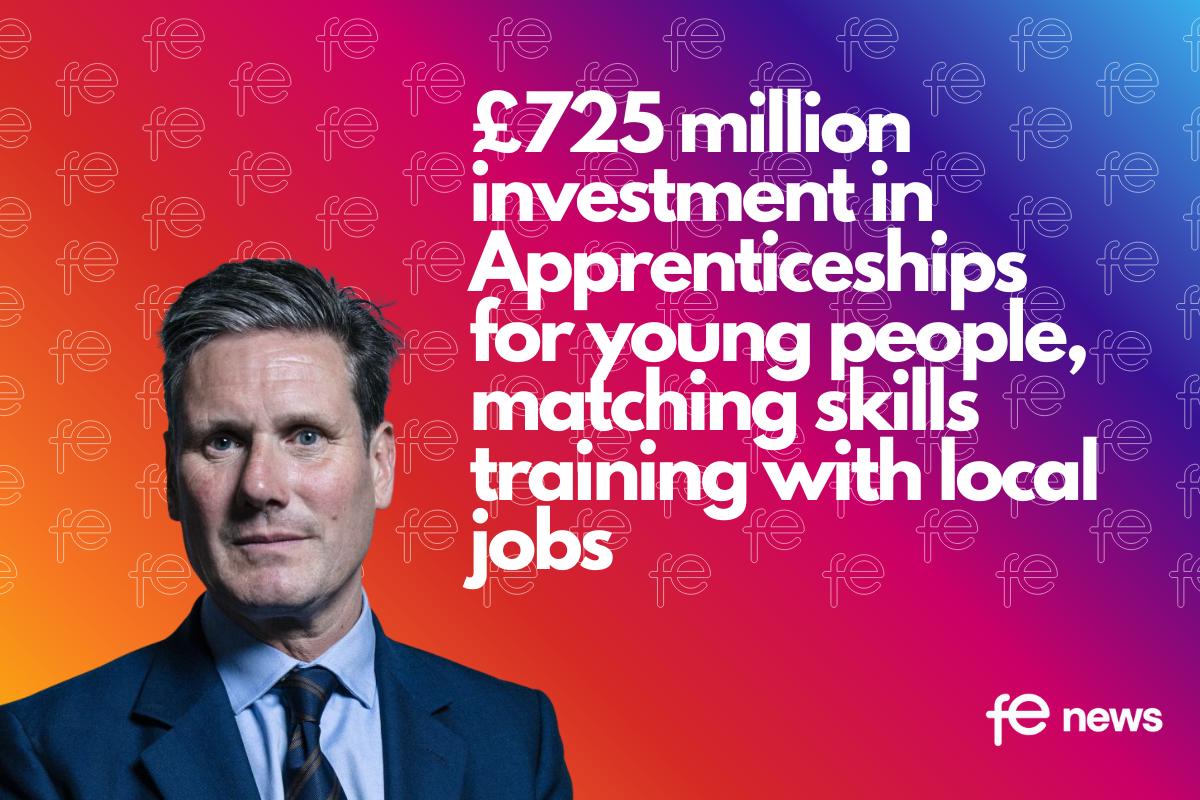Growing funding gap between FE and HE means fewer opportunities and poorer health outcomes for students taking vocational qualifications – Sector Response

Further education pathways: Examining the life outcomes of students studying #vocational qualifications
A new report from the Education Policy Institute (EPI), commissioned by the Health Foundation, which examines the life outcomes of students studying vocational qualifications has found that students taking vocational qualifications have fewer opportunities and poorer health outcomes. New financial settlement is needed to close the gap.
Our new report for @HealthFdn finds many students taking vocational qualifications struggle to progress in education or develop crucial life skills: https://t.co/fAZzc2Ymef
These findings were echoed by young people in the Health Foundation’s #FutureHealthInquiry ⬇️ pic.twitter.com/j34BeoLmFT
— EPI (@EduPolicyInst) November 7, 2019
- Students taking vocational qualifications, equivalent to A levels or below, are more likely to have poor health outcomes over the long term than those taking ‘academic’ qualifications – due to lower attainment levels and worse employment outcomes.
- Young people studying vocational qualifications face employment challenges: many struggle to progress through education, and require further support to develop critical life skills.
- However, there is strong employer demand for the skills that can be provided through vocational routes – greater support for this group could improve skills, attainment and health prospects.
- A long-term funding settlement for the further education sector is likely to improve young people’s outcomes – but the government’s recent one-year commitment of £400m fails to provide this.
The research considers the majority of young people who do not pursue a ‘traditional’ A level-Bachelor’s degree route after completing secondary school.
An increasing proportion of young people now opt for vocational equivalents to A levels, continued GCSE study, and apprenticeships. Despite this, these students are often overlooked in public debates.
This detailed study assesses the opportunities, skills and outcomes of this majority student group, before considering how the provision of vocational qualifications can be improved, in order to enhance life chances.
Key findings
Around half of school leavers follow vocational routes, yet many face employment challenges
- An increasing proportion of 16- to 18-year-olds follow vocational pathways, as an alternative to A levels. This is driven by a rise (11% since 1994) in those taking vocational equivalents to A levels, and an increase in those retaking their GCSEs at this age.
- Young people following these pathways face a challenging labour market: since the 2008 recession, when entering work, non-graduate students have become much more likely to undertake zero hours contracts, or involuntary temporary or part-time work.
Students in vocational education are more likely to have poor health outcomes
- Young people on vocational pathways are more likely to experience worse health outcomes than those in academic routes. This is due to lower levels of educational attainment, completing education at a lower level, and worse employment outcomes.
- In the UK, at the age of 30, those who left with the lowest education levels have a life expectancy four years lower than those educated to the highest levels. Students on vocational routes are disproportionately represented among this lower-educated group.
Vocational students struggle to progress in education and lack important life skills
- Young people in vocational education often fail to move to higher levels: while 79% of A level students progress to a higher level in education by the age of 25, just 42% of vocational students do.
- The government’s new T levels could play an important role in increasing progression, but the requirement of passing GCSE English and maths could prove too great a hurdle for some.
- While students face labour market challenges, there is growing employer demand for skills gained through intermediate level vocational qualifications (the same level as A level). Those topping up qualifications after age 19 are likely to benefit, and would see substantial salary returns later in life. However, the cost of further study at this level is often cited as a barrier.
- The numeracy and literacy skills of vocational students in England are low by international standards. Digital skills are also lacking, and policy-makers should explore how they can boost ‘soft skills’, such as communication, leadership and teamwork.
Careers guidance for young people in vocational routes still has a long way to go
- With qualification routes far more complex than academic routes, good careers guidance is critical for young people taking vocational qualifications.
- The government’s Careers Strategy, which sets out standards for schools and colleges, is a step in the right direction – yet it is uncertain whether schools and colleges are sufficiently resourced to meet new minimum standards for careers guidance.
The funding gap between further and higher education is large, and growing
- Funding per student in further education (FE) colleges fell by 9% in real terms between 2012/13 and 2018/19, from £5,870 to £5,320.
- Over the long-term, the funding gap between FE and higher education has grown considerably. In 2005/06, funding rates for further education were 12% below rates for higher education – in 2017/18, they were 39% below.
- In September, the government committed an additional £400m for 16-19-education (colleges and sixth forms), which included a strong focus on students taking vocational and technical qualifications. However, this is a one-year commitment, and only repairs a quarter of real terms funding cuts for 16-19 education since 2010-11.
Policy recommendations
- To boost low literacy and numeracy skills, the government should, for the moment, retain the ambition of all young people passing English and maths GCSE by age 19 – but it must monitor how this is improving young people’s employment prospects, and ensure repeated GCSE resits do not adversely affect young people’s wellbeing.
- Given employer demand and the high returns for young people, the government should offer maintenance loans to those over age 19 pursuing intermediate vocational qualifications.
- The government should ensure that colleges have the resources to meet their new responsibilities for careers advice.
- The government should provide the further education sector with a more enduring financial settlement to sustain quality provision in the long term.
Sector Response
 Commenting on the new research, Graham Hasting-Evans, Group Managing Director, NOCN, said:
Commenting on the new research, Graham Hasting-Evans, Group Managing Director, NOCN, said:
“It is well documented that funding disparity between the academic and the vocational routes for learning do not reflect the real cost of delivering technical skills that employers want. The academic route is better funded, but itself not adequately funded. Vocational & technical education and skills are the poor relation, which is why we see the outcomes demonstrated in the research.
“We need more funding – more for schools and a whole lot more for further education and adult learning. The next Government needs to face up properly to this challenge”
 Stephen Evans, Chief Executive, Learning & Work Institute, said:
Stephen Evans, Chief Executive, Learning & Work Institute, said:
“This report rightly highlights the importance of learning and skills to life and work, including health and wellbeing. Our research has also shown the positive impacts that learning for people of all ages has on social justice, health and wellbeing, and active citizenship.
“The EPI’s report echoes the findings of our Youth Commission that progress improving the qualifications of young people has stalled in recent years, at lower levels than in many other countries. Literacy, numeracy and digital are central to this and I’m pleased the EPI report argues that we need to do much, much better here.
“Equally important for me is the recognition of the link between learning and wider life chances. It’s crucial that every young person has access to a high quality education, but also that people of all ages have the chance to learn and update their skills throughout their lives. Our Youth Commission will soon be making recommendations for improving education and employment support for young people, and the case for learning throughout life is clear.”
 Phil Hall, AAT Head of Public Affairs & Public Policy, said:
Phil Hall, AAT Head of Public Affairs & Public Policy, said:
“AAT agrees with the EPI that significantly more FE funding is needed.
“The recently announced increase in funding for 16-19 year olds was welcome but whilst £400m sounds a lot, it’s £2.5bn less than is needed to restore FE funding to 2010 levels in real terms.
“Much more is needed to ensure the country properly invests in skilling future generations to compete in an increasingly global economy and having the EPI add its voice to numerous calls for the same is most welcome.”
 David Hughes, Chief Executive, Association of Colleges (AoC), said:
David Hughes, Chief Executive, Association of Colleges (AoC), said:
“Today’s report from the EPI is further evidence that our education system is deeply unequal. Technical and vocational qualifications have, for too long, been viewed as the route ‘for other people’s children’.
“This report shows how their life chances can be impacted compared with those taking the so-called academic route. We need to debate and discuss the findings with politicians and policy makers, because our economy needs more skilled people and this situation is simply not fair.
“With colleges delivering the majority of vocational courses, they are producing the skilled people that employers are crying out for. That’s precisely why a sustainable and long-term funding settlement is needed. We need an education system in this country that supports and uplifts everybody, no matter the route they choose.”
 Mark Dawe, Chief Executive of the Association of Employment and Learning Providers (AELP), said:
Mark Dawe, Chief Executive of the Association of Employment and Learning Providers (AELP), said:
“The EPI report has raised some important issues, but before we consider what actions should be taken, we need to better understand if there are differences between classroom based vocational and work based outcomes.”
 David Robinson, report author and Director of Post-16 and Skills at the Education Policy Institute, said:
David Robinson, report author and Director of Post-16 and Skills at the Education Policy Institute, said:
“This report shows that young people in vocational routes face many more challenges than those in ‘traditional’ academic routes. Students are less likely to progress in education, secure fewer life skills, and have more limited employment opportunities. As a result, the health outcomes of this student group are likely to be worse than their academic peers.
“The government has sought to address this divide through a series of reforms to vocational education, but it must go further by addressing longstanding funding inequalities. Until an enduring financial settlement is established, young people in vocational routes are likely to face more limited prospects.
“This study took a broad look at vocational pathways in England, including apprenticeships. Its primary focus was to compare student outcomes in further education routes with those in more academic routes. We recognise that there is significant variation in the outcomes of young people within these different forms of vocational training. We plan to undertake further research in the future to explore these differences.”
Jo Bibby, Director of Health at the Health Foundation, who commissioned the policy analysis and recommendations, said:
“The debate around education is too often narrowly focused on what students will earn in the future and those completing ‘traditional’ academic routes. This report highlights the need to broaden the discussion to include all young people and all education pathways.
“Education is a sector which isn’t often associated with health and the tremendous impact it has on the futures of our young people should not be underestimated. These recommendations clearly set out where government can take action now to secure the health of our young people for the future.”
ABOUT THE POLICY RECOMMENDATIONS
EPI was commissioned by the Health Foundation as part of a two-year Young people’s future health inquiry. The inquiry is a first-of-its-kind research and engagement project that aims to build an understanding of the influences affecting the future health of young people.
The Health Foundation selected expert organisations across seven key policy areas to provide a deep dive into the building blocks of health for young people. The below reports and policy recommendations will be published in the following weeks:
- Private rental housing – Chartered Institute of Housing
- The impact of schools on wellbeing – The Children and Young People’s Mental Health Coalition and the Centre for Mental Health
- The impact of transport on young people’s lives – Sustrans and the University of the West of England
- The quality of work on offer to young people – Institute for Employment Studies
- Post-16 education and training outside of the path to university – Education Policy Institute
- Youth provision – Centre for Youth Impact
- Living with or without a financial safety net – The Resolution Foundation
By ‘vocational education students’ and those on ‘further education pathways’, we refer to the same group of students: those studying ‘non-academic’ qualifications. This includes those studying vocational qualifications outside of further education institutions (such as in schools). It does not include those studying A levels in further education institutions.
About the Education Policy Institute (EPI): An independent, impartial, and evidence-based research institute that promotes high quality education outcomes, regardless of social background. We achieve this through data-led analysis, innovative research and high-profile events.
About the Health Foundation: An independent charity committed to bringing about better health and health care for people in the UK.
Our aim is a healthier population, supported by high quality health care that can be equitably accessed. We learn what works to make people’s lives healthier and improve the health care system. From giving grants to those working at the front line to carrying out research and policy analysis, we shine a light on how to make successful change happen.
We make links between the knowledge we gain from working with those delivering health and health care and our research and analysis. Our aspiration is to create a virtuous circle, using what we know works on the ground to inform effective policymaking and vice versa.
We believe good health and health care are key to a flourishing society. Through sharing what we learn, collaborating with others and building people’s skills and knowledge, we aim to make a difference and contribute to a healthier population.











Responses